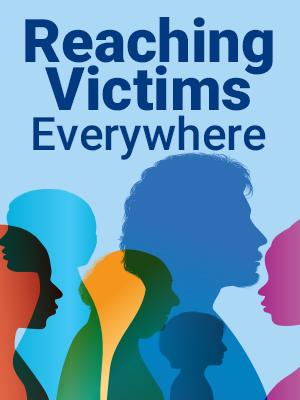Archival Notice
This is an archive page that is no longer being updated. It may contain outdated information and links may no longer function as originally intended.
Serving Victims Everywhere
OVC believes that crime victims should have access to the evidence-based services and support they need to begin their physical, emotional, and financial recovery. However, OVC recognizes that there are serious challenges to achieving this goal. Strengthening connections across allied fields to expand the availability and quality of services that impact a victim’s healing are among these challenges.
Center for Victim Research
OVC supported the launch of the Center for Victim Research (CVR) in response to the victim assistance field’s call for increased statistical data, evidence-based practices, and program evaluation to guide policymakers, funders, and practitioners. The CVR website offers several online tools for the field, including a collection of more than 2,000 victim research-related reports and journal articles, and a database of researchers with experience working in victimology. Since its inception, CVR has—
- completed research synthesis to organize the latest victim research findings in areas important to OVC and the field, such as mass violence, elder abuse, identity theft and financial fraud, and homicide co-victimization;
- developed a host of useful tools for grantees, such as a series of quick reference guides on evaluation;
- revamped its performance management data tracking tool to help grantees better visualize and utilize their data;
- connected VOCA agencies with the primary crime data sources in their states—their Statistical Analysis Center—to ensure VOCA agencies are making data-driven decisions about how to identify victim populations and needs in their jurisdictions, and to allocate funds accordingly; and
- established a Journal Club to educate the field about translating victim research findings that improve services. Participation in this effort allowed the Utah Office for Victims of Crime (UOVC) to survey victim advocates in their state regarding burnout/vicarious trauma. Of the 210 survey respondents, about 50 percent said that involvement in their organization contributes to their level of burnout/vicarious trauma and/or that their organization does not provide any support for those experiencing burnout/vicarious trauma. UOVC is now working to provide vicarious trauma support to these advocates and plans to increase their efforts in this area.
National Resource Center for Reaching Victims
The OVC-funded National Resource Center for Reaching Victims aims to be a one-stop shop where providers, policymakers, and other professionals can obtain information and expert guidance to enhance their capacity to identify, reach, and serve all victims, especially those from communities that often have less access to services and fewer avenues to justice. In 2019, the center awarded 14 grants to service organizations with innovative ideas on how to improve outreach and service to victims and survivors. Some of the goals of these innovative projects were to—
- increase access to a seamless continuum of evidence-based healing services, promote trauma resolution and recovery, and reduce incidents of repeat or ongoing victimization and/or retributive violence for boys and men of color (and their families) who were previously incarcerated or otherwise involved with the criminal justice system, and who are victims of gun violence;
- identify and develop strategies to eliminate the barriers faced by lesbian, gay, bisexual, transgender, and questioning sexual assault survivors seeking legal services;
- spread awareness of the experiences of survivors of violence and trauma who are deaf or hard of hearing through videos; and
- enhance a current rape crisis services program to remove barriers to engaging with and reaching tribal communities.
Enhancing Access to Services
Many victims of crime—particularly those with limited English proficiency (LEP) or who are deaf or hard of hearing—may experience barriers that prevent them from accessing critical services. The inability to report crimes or access services due to language barriers can isolate victims and intensify their fear and distrust. The traumatic impact of being a victim of crime, when left unaddressed, often leads to long-term physical, emotional, social, and financial problems for victims. Survivors are more inclined to seek services from organizations operating within their community and from service providers who understand and are skilled at addressing the unique language-access challenges that victims face.
To enable all victims of crime to access linguistically appropriate services, the criminal justice and victim services systems need to develop new partnerships that will enable them to serve a more diverse client base. In FY 2018, OVC funded 11 awards totaling $2.6 million under the Enhancing Access to Services Program. Another 10 awards, totaling nearly $2 million, were awarded in FY 2019 under a similarly named program—Enhancing Language and Other Access to Services. Both programs will enhance services for crime victims in linguistically specific communities by breaking down barriers that prevent millions of crime victims throughout the country who are deaf, hard-of-hearing, or LEP from accessing the services they need following their victimization.
Supporting Child and Youth Victims
Victimization, left unaddressed, can have serious, long-lasting consequences for children’s physical and mental health. Research demonstrates that trauma, left untreated, may manifest into a range of physical, emotional, and behavioral problems. In FY 2019, the OVC-funded Linking Systems of Care for Children and Youth (LSC) project continued their work addressing the enduring issue of child and youth victimization through state-level demonstration projects. The project released a new website that includes—
- guiding principles for facilitating values discussions with stakeholders, structuring community needs assessments, and assisting community collaboratives in shaping, informing, and reviewing services and referrals to address children and youth exposed to violence;
- an online toolkit for LSC coordinators that provides guidance and tools for jurisdictions interested in replicating LSC activities; and
- lessons learned by the demonstration sites in Virginia, Montana, Illinois, and Ohio during the planning and implementation phases.
In FY 2019, OVC responded to research that recommended a multitude of changes consistent with an all-systems approach to resolving complex and critical issues associated with child abuse and neglect by releasing the Reducing Child Fatalities and Recurring Child Injuries solicitation. Under it, OVC awarded a total of $5.2 million in funding to five demonstration sites and one technical assistance (TA) provider. In the first year, the demonstration sites developed implementation plans with strategies to keep children safe and advance towards a child and family well-being system, and sustainability plans and evaluation plans that would document outcomes and best practices, policies, and models for wider dissemination.
In year two, the demonstration sites began to pilot test equitable, community-led solutions that keep children safe and support resilient families. TA is provided by a team of national experts using expert-peer and peer-peer coaching. The TA supports sites’ improved data collection and analysis using a safety science approach, development of strong community collaboratives, engagement of persons with lived experiences, and developmental evaluation. This assistance is geared towards helping sites plan and implement an all-systems approach and coordinated strategic planning to respond to and reduce their child maltreatment fatalities and child crime victimization.
In FY 2019, OVC awarded $4.96 million through the solicitation to build on lessons learned from an FY 2016 initiative. The TA provider, Alliance for Hope International, will engage with five Family Justice Centers (FJC)—Tulsa Family Safety Center, Sonoma FJC, New Orleans FJC, Chattanooga FJC, and Palomar—to implement the validated assessment tool; increase partnerships with traditional and non-traditional FJC services to serve identified polyvictims more holistically; expand case management services to include a thorough understanding of the specific needs of the survivors; and build capacity within their communities to leverage existing and new resources for crime victims.
Expanding Services to Victims of Domestic Violence and Sexual Assault
In FY 2020, under the Emergency Transitional Pet Shelter Housing and Assistance Grant Program, OVC made six awards totaling more than $2.2 million to support shelter and transitional housing services for victims of domestic violence, dating violence, sexual assault, or stalking, and their companion animals. Objectives are to increase the number of shelter beds and transitional housing options available to meet the needs of victims of domestic violence who need shelter or housing for them and their companion animals; and to provide training to local stakeholders on the link between domestic violence and the abuse and neglect of companion animals, the needs of victims of domestic violence, best practices for designing and delivering services that protect victims’ confidentiality, and best practices for providing or offering referrals to support services to such victims.
According to the Centers for Disease Control and Prevention, female genital mutilation and cutting (FGM/C) refers to procedures involving partial or total removal of female genitalia or other injury to female genital organs for non-medical reasons. In response to the estimated half a million girls and women in the United States that have either undergone FGM/C in the past or may be at risk of FGM/C in the future, OVC awarded seven grants totaling nearly $3 million under the Addressing Female Genital Mutilation and Cutting funding opportunity in FY 2020. Six demonstration sites will build or enhance community responses to address the needs of victims of FGM/C, and one TA provider will provide targeted TA to inform frontline providers on how to identify and serve victims and persons at risk of being victimized.
In FY 2020, OVC awarded nearly $4 million to eight institutions to support the establishment or expansion of Sexual Assault Nurse Examiner (SANE) programs that offer medical forensic care, advocacy, and other victim services to sexual assault survivors on campuses of higher education. The Expanding SANE Services to Victims of Sexual Assault on Campus program will develop, expand, or strengthen SANE services to improve the delivery of post-assault medical and advocacy services. Campuses will collaborate with victim service providers in the communities in which the institutions are located. If victim services programs are not available in the community or are not accessible to students, the institution will provide a victim services program on campus in collaboration with a community-based organization.




